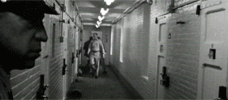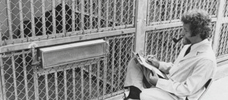Reviews
Frederick Wiseman
USA, 1999
Credits
Review by Leo Goldsmith
Posted on 26 June 2008
Source Zipporah Films DVD
Categories Frederick Wiseman
To point out that Frederick Wiseman is a keen artisan of duration might sound like a coy way of saying that his movies are very long. And indeed, the most superficially obvious mark of Wiseman’s later films is in fact their length: an overwhelming number of the films he’s made since the 80s run for more than three hours, and one (Near Death) runs for nearly six. But while this tendency toward long running times might, in another director, be considered to be rather insufferably arty or self-indulgent, with Wiseman the opposite is more the case: his films are populist and stylistically approachable on the one hand, and self-effacing and generous to their subjects on the other. Perhaps one might accuse his later films of being too generous in this latter regard, presenting scenes of mundane activities at length and in detail, almost with the omnivorous interest of an actuality film from the early days of cinema.
But Wiseman’s films are neither Lumière demonstrations, nor Empire, nor C-Span—they are thematically selective, constructed with a clear aptitude for montage, and dialectical without being opinionated. As they are shown on public television, Wiseman is given space to develop themes in a forum that allows for a certain flexibility of running time, outside of the rigorous time-structures of network and cable television. (In this way, Wiseman is similar to the expatriate British filmmaker Peter Watkins, whose own, more radical experimentations with duration similarly evade the constraints of commercial television’s “universal clock.”) In Wiseman’s films, the prevalence of lengthy takes, sequences, and films functions in precisely the same way we describe similar techniques in a long-take fiction film: the extended shot- and scene-durations give intelligibility and wholeness to the space of action and allow the actors’ performances to take shape without the interference or assistance of editing. In this way, Wiseman clearly wants his subjects to express themselves, even in their most superficial, public ways, with the most prosaic masks of their lives in the world. But at the same time, as is especially vivid in a film like Belfast, Maine, his films are, in a musical sense, almost ambient—they define a space to be lived in, like the town itself.
In its four and a quarter hours, Belfast, Maine enumerates the many goings-on in the titular New England town in a compendious manner, albeit with a particular emphasis on those things that seem to interest Wiseman most: healthcare (especially of the elderly or handicapped), work and the working class, recreation, food, and education (comprising high school, adult education, and other forms of instruction). In a free-association montage, Wiseman conveys the range of life in Belfast: the trailers and the spacious suburban homes; fishing as a profession and as a hobby; the Laundromat and the taxidermist’s; the ashen-faced queue at the local soup kitchen and the beige cubicle culture at the offices of a credit card company (where a representative says sternly into her telephonic headgear, “It’s very important you give me a call”). As in his previous “smalltown symphony,” Aspen, Wiseman seems intent on challenging the assumptions that one might have about such a place and its people, but here he is also interested in the abstract. Beginning on water, in the harbor at sunrise, and ending in the town graveyard, Belfast, Maine presents not only an informative slice of New England living, but also a metaphorical narrative of life and its many difficulties.
Indeed, life in Wiseman’s Belfast often seems especially difficult. This is, in the grim words of a Pentecostal preacher at a particularly downer baptism, “a broken world”—but it is also one which the residents of Belfast, Maine, are striving constantly to improve. There are many scenes with social workers - in their offices and making house calls - dealing with elderly or handicapped people in need of medication, counseling, or other kinds of care. We meet Leroy, a gentle, growling bulldog of a man who has suffered a stroke and thus has cut down his intake of cigarettes—only three or four packs a day, down from seven or eight. We also meet Ange, a woman in her twenties who resolves, on the one hand, to overcome the history of her father’s abuse, and, on the other, to shoot him between the eyes if he ever tries to harm her or her mother again. There is everywhere a pervasively dour sense of struggle that is nonetheless matched by a certain hardiness, an alchemical paradox that one is tempted to characterize as native to New England.
The film is presented as several days and nights in early autumn, interpolated with scenes of the town’s docks and waterways, to which the film, like Belfast’s residents, continually returns. This structure suggests a relentless diurnal cyclicality like the town’s own perpetual motion: wake up, go to work, keep some appointments, shop, attend a class, and repeat. Wiseman even builds a feeling of redundancy into the film by allowing certain events to repeat themselves in different iterations throughout: there are two painters in the film, one working downtown and the other outside of town; there are visits to Episcopal, Baptist and Protestant churches; there are examinations of the processes of making both chocolate donuts and chocolate cake. These repetitions may seem irksome or pointless at first glance, but they are a part of Wiseman’s interest in the town’s patter as well as its specificity, its rhythm and timbre as well as the tiny distinctions between seemingly anonymous, uniform mundanities. As the film progresses, one might even start to become familiar with some of the locals, like the old lady from the floral arrangements class who can also be spotted at the amateur history lecture on Maine’s involvement in the Civil War.
But by far the most fascinating aspect of Belfast, Maine, and the key to Wiseman’s study of life in the town, is the idea of work, not only in the abstract, as a project of spiritual, intellectual, and physical betterment, but also in its most literal and quotidian sense. The credit card company notwithstanding, Belfast is largely a blue-collar town, and while there are many residents who still earn livings as fishermen, the town’s largest employers are its factories. The very concept of factory labor is embedded in the culture of the town, appearing everywhere, as when an AIDS educator in the county jail likens cells to little factories, or when a high school teacher, discussing Moby Dick, speaks of whaling as both hunting and factory work. The teacher thus describes Captain Ahab as literature’s first “working-class tragic hero,” while elsewhere a rehearsal for an amateur production of Death of a Salesman reinforces the notion that, even if Wiseman is not presenting tragedy in any formal sense, his working-class heroes are no less worthy subjects of art than Melville’s or Miller’s.
Many American films and television shows (ER, The West Wing, almost any Michael Mann film) valorize or even fetishize the experience of work in particularly intense and rewarding jobs, but no one pays as much attention to those blue-collar jobs in which Wiseman’s subjects spend half their lives. Belfast, Maine profiles three major factory assembly lines in the town - the fish cannery, the frozen “baked stuffed potatoes” factory, and the slightly smaller salmon smokery - and in each we get a sense, not of occupational fulfillment, but of getting by, of the means and duration of earning one’s living. True to sometime aims of the film’s liberal forum on public television, we also get a glimpse of an overlooked (or even intentionally sublimated) link in the chain of American food consumption (rather like the similarly Marxist-materialist project of Mister Rogers’ Neighborhood’s “Picture Picture” segments, like How Crayons Are Made). But more central to Wiseman’s concerns is how these scenes illuminate and document the experience of this small American town, one that might otherwise strike us as uniform, anonymous, interchangeable. Belfast, Maine is impressionistic, even possibly epic in the breadth of its curiosity, but instead of an ironic distance or an air of Rockwellian kitsch, the film opts for mere patience to convey something of what it’s actually like in the town, what people do there, how they do it, and the time it takes them.
More Frederick Wiseman
-

Titicut Follies
1967 -

High School
1968 -

Law & Order
1969 -

Basic Training
1971 -

Juvenile Court
1972 -

Primate
1974 -

Welfare
1975 -

Meat
1976 -

Sinai Field Mission
1978 -

Manoeuvre
1979 -

Model
1980 -

The Store
1983 -

Blind
USA -

Adjustment & Work
1986 -

Missile
1987 -

Central Park
1989 -

Near Death
1989 -

Aspen
1991 -

Zoo
1993 -

High School II
1994 -

Ballet
1995 -

La Comédie-Française
1996 -

Public Housing
1997 -

Belfast, Maine
1999 -

Domestic Violence / Domestic Violence 2
2001 / 2002 -

The Last Letter
2002 -

State Legislature
2006
We don’t do comments anymore, but you may contact us here or find us on Twitter or Facebook.



